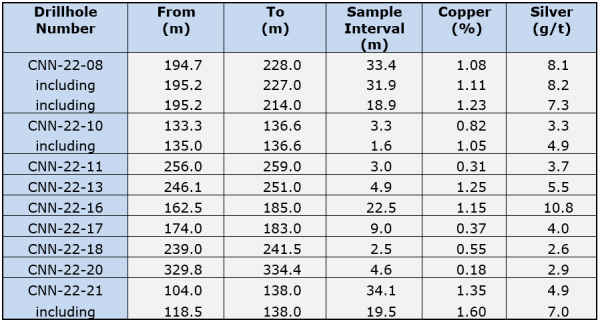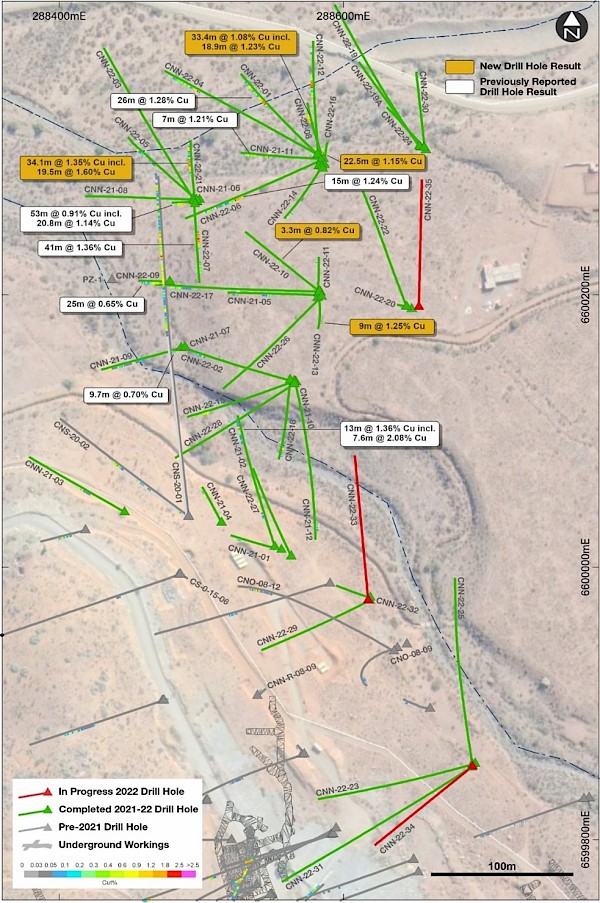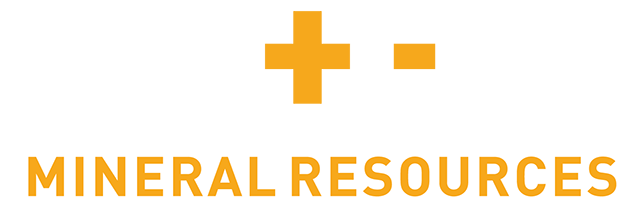Vancouver, British Columbia – (April 26, 2022) – Battery Mineral Resources Corp. (TSXV: BMR) (OTCQB: BTRMF) ("Battery" or “BMR” or the "Company") is extremely pleased to announce encouraging drill core assay results from the ongoing 2021 – 2022 exploration and infill drill program focused on extensions of the Cinabrio orebody, the Dalmacia target and San Andres target within the Punitaqui mine complex (“Punitaqui”) in Chile. These drilling results continue to highlight the strong copper grades and the growing vertical extent of the Cinabrio Norte target.
Punitaqui is slated for resumption of copper concentrate production in Q4-2022. The Cinabrio Norte target represents a potential northern extension of the main Cinabrio mine orebody, which historically was the primary source of ore feed to the Punitaqui copper ore concentration plant for eight-plus years (see Figure 1).
Highlights
- New assay results for Cinabrio Norte include the following (see Table 1):
- CNN-22-08: 33.4 meters (“m”) at 1.08% Copper (“Cu”) including 18.9m at 1.23% Cu
- CNN-22-21: 34.1m at 1.35% Cu including 19.5m at 1.60% Cu
- CNN-22-16: 22.5m at 1.15% Cu
- CNN-22-13: 4.9m at 1.25% Cu
- CNN-22-10: 3.3m at 0.82% Cu
- At Cinabrio Norte, 41 holes have been completed for 9,472 meters (“m”) and drilling is ongoing with two diamond drills.
- Significant visual copper mineralization has been recorded in 30 of the 41 holes.
- To date, the drilling has outlined a significant zone of high-grade mineralization in the northern portion of the target area which remains open at depth.
- The initial phase 1 program of step-out holes has been expanded from 24 holes (3,600m) to 45 holes, totaling 11,000m which will test 400m of strike length to a depth of 330m.
Battery CEO Martin Kostuik states; “We are continuing to produce encouraging results from the identified targets at our former producing Punitaqui copper mine in Chile. These recent drillhole results at the Cinabrio Norte target have produced very positive copper grades and further highlighted the down-dip extent and thickness. Cinabrio Norte is about 100 meters north of the original Cinabrio deposit which was the primary source of copper ore feed to the Punitaqui mill for eight-plus years. This new target has the potential to provide the Company with an additional source of copper mineralization as ore feed for the Punitaqui processing plant.”
Furthermore, CEO Kostuik remarks: “The development of Punitaqui towards a restart is progressing well on all fronts, including drilling, engineering and permit modifications. We look forward to the potential of these latest assay results for the Cinabrio Norte Target contributing to the forthcoming restart plan and cashflow at Punitaqui later this year”.
Cinabrio Norte Drill Program
The Cinabrio Norte phase 1 drill testing will continue to follow-up on a limited number of historic drillholes that targeted the northern extension of the Cinabrio orebody. The historic exploration drilling confirmed that the favorable targeted stratigraphic unit (“TSU”) that hosts the copper mineralization within the Cinabrio orebody extends to the north. The TSU has been mapped along a north-south strike from the mine. Importantly, the Cinabrio Norte target is only 110m north of the Cinabrio underground workings on level 200m. Historic hole CNS-20-01, drilled in 2020 by the prior operators, was drilled completely within the TSU resulting in multiple mineralized intercepts and, most notably, confirmed the presence of TSU for over 200m of strike length with significant copper sulphide mineralization (CNS-20-01: 48m at 0.64% Cu, 3m at 0.47% Cu and 6m at 0.45% Cu).
The current drilling was planned as a series of step-out holes to test the TSU 400m along strike (north-south) to a depth below surface (“down-dip”) of 330m. The current BMR drilling has outlined a significant zone of high-grade mineralization in the northern portion of the target zone which remains open at depth. This initial phase 1 program of step-out holes has been expanded from 24 holes (3,600m) to 45 holes, totaling 11,000m. Significant visual copper mineralization has been recorded in 30 of the 41 holes completed to date. The remaining planned holes will test “drilling gaps between the existing underground workings and the northern zone as well as further test the mineralization at depth.
Complete assay results were recently received for nine holes (see Figure 1 and Table 1).
Table 1: Current Cinabrio Norte Exploration Drill Intercepts

Significant intercepts reported earlier from the phase 1 drilling include (see Table 2):
- CNN-22-01: 26m at 1.28% Cu
- CNN-21-02: 13m at 1.36% Cu including 7.6m at 2.08% Cu
- CNN-21-06: 53m at 0.91% Cu including 20.8m at 1.14% Cu
- CNN-21-07: 9.7m at 0.70% Cu
- CNN-21-11: 7m at 1.21% Cu
- CNN-22-06: 15m at 1.24% Cu
- CNN-22-07: 41.5m at 1.36% Cu
- CNN-22-09: 25m at 0.65% Cu
Please refer to news releases dated March 15, 2022 and April 13, 2022 for previous drill assays.
Drillhole CNN-22-08 was drilled in the northern end of the target and was planned as a 50m step-out down-dip on the targeted stratigraphic unit (“TSU”) from the earlier intercept in hole CNN-22-01 of 26m at 1.28% Cu. This hole successfully intercepted 53m of the TSU within which a 33.4m intercept grading 1.08% Cu was returned from 194.7m downhole including 18.9m at 1.23% Cu from 195.2m. The intercept confirms both the vertical continuation and grade of the copper mineralization.
Drillhole CNN-22-10 was drilled in the central part of the target to test TSU down-dip of the broad, well mineralized intercept in CNN-22-07 of 41m grading 1.36% Cu. A 17m TSU section was drilled from 133.3m with spotty chalcopyrite in the upper part of the unit that yielded 3.3m at 0.82% Cu. This hole confirms that in the central part of the zone the TSU appears to be thinner at these depths. Whether this change in the TSU is attributable to a structural or stratigraphic control is yet to be determined.
Drillhole CNN-22-11 was planned as a down-dip test of the TSU in the central part of the target area. The hole was a down-dip step-out of the previous hole CNN-22-10 that intercepted 3.3m at 0.82% Cu. The new hole cut a 23m section of the TSU with variable pyrite, minor copper mineralization and a best copper result of 3m at 0.31% Cu from 256m. The results further indicate a thinning of the TSU down-dip in the central part of the Cinabrio Norte target. Future drilling will test thickness at greater depths.
Drillhole CNN-22-13 was collared in the central part of Cinabrio Norte and targeted the TSU down-dip of holes CNN-21-05 (2.5m at 0.46% Cu) and CNN-22-02 (13m at 1.36m). CNN-22-13 successfully intercepted 24m of TSU that produced an assay interval of 4.9m grading 1.25% Cu from 246.1m and indicates a continuation of mineralization down-dip in this area.
Drillhole CNN-22-16 was collared in the northern part of the target area and was designed as a down-dip step-out of the TSU from the CNN-21-11 intercept of 7m at 1.21% Cu. The new hole intercepted a 100m section of the TSU that yielded a 22.5m intercept at 1.15% Cu from 162.5m thus confirming the down-dip continuation of the mineralization. This new intercept further supports this interpreted mineralized copper zone in the northern part of Cinabrio Norte.
Drillhole CNN-22-17 was drilled in the central Cinabrio Norte area as a down-dip step-out of hole CNN-22-09 that cut 25m at 0.65% Cu hosted within a 40m section of the TSU. The new hole intercepted a narrower TSU section of 15m that produced an assay interval of 9m grading 0.37% Cu from 174m.
Drillhole CNN-22-18 was drilled in the southern part of Cinabrio Norte area and targeted a down-dip step-out of the CNN-21-02 copper intercept of 13m at 1.35% Cu hosted within a 32m section of the TSU. This hole cut a 30m section of TSU with only minor copper sulphide mineralization that resulted in a best assay of 2.5m grading 0.55% Cu from 239m.
Drillhole CNN-22-20 was collared in the central part of Cinabrio Norte and targeted the TSU down-dip of CNN-22-13 that intercepted a 24m section of TSU and an assay of 4.9m at 1.25% Cu. CNN-22-20 intercepted 17m of TSU with only minor copper sulphides that produced an assay interval of 4.6m grading 0.18% Cu from 329.8m.
Drillhole CNN-22-21 was a follow-up hole designed to test the TSU and copper sulphides north of previously reported CNN-21-06 that resulted in an 83m zone of TSU that returned 53m at 0.91% Cu including a higher-grade zone of 20.8m grading 1.14% Cu. The new hole successfully intersected 90m of TSU that resulted in assays of 34.1m at 1.35% Cu from 104m including 19.5m grading 1.60% Cu from 118.5m. This result further supports the presence of a significant zone of copper mineralization in the northern area of Cinabrio Norte.

Quality Control
Sample preparation, analysis and security procedures applied on the BMR exploration projects is aligned with industry best practices. BMR has implemented protocols and procedures to ensure high-quality collection and management of samples resulting in reliable exploration assay data. BMR has implemented formal analytical quality control monitoring for all field sampling and drilling programs by inserting blanks and certified reference materials into every sample sequence dispatched.
Sample preparation is performed by ALS Global - Geochemistry Analytical Lab in La Serena, Chile and sample analyses by ALS in Lima, Peru. ALS analytical facilities are commercial laboratories and are independent from BMR. All BMR samples are collected and packaged by BMR staff and delivered upon receipt at the ALS Laboratory. Samples are logged in a sophisticated laboratory information management system for sample tracking, scheduling, quality control, and electronic reporting. Samples are dried then crushed to 70% < -2 millimeters and a riffle split of 250 grams is then pulverized to 85% of the material achieving a size of <75 microns. These prepared samples are then shipped to the ALS Laboratory in Lima Peru for analyses by the following methods:
- ME-ICP61: A high precision, multi-acid digest including Hydrofluoric, Nitric, Perchloric and Hydrochloric acids. Analysed by inductively coupled plasma (“ICP”) mass spectrometry that produces results for 48 elements.
- ME-OG62: Aqua-Regia digest: Analysed by ICP-AES (Atomic Emission Spectrometry) or sometimes called optical emission spectrometry (ICP-OES) for elevated levels of Co, Cu, Ni and Ag.
Certified standards are inserted into sample batches by ALS. Blanks and duplicates are inserted within each analytical run. The blank is inserted at the beginning, certified standards are inserted at random intervals, and duplicates are analysed at the end of the batch.
Additional Information
Michael Schuler, Battery Mineral Resources Corp. Chile Exploration Manager, supervised the preparation of and approved the scientific and technical information in this press release pertaining to the Punitaqui Exploration Drill Program. Mr. Schuler is a qualified person as defined by National Instrument 43-101 - Standards of Disclosure for Mineral Projects.
About Battery Mineral Resources Corp.
Battery Mineral Resources (“BMR”) is a battery mineral company focused on growth through cash-flow, exploration, and acquisitions in favourable mining jurisdictions. BMR is currently developing the Punitaqui Mining Complex, a past copper-gold producer, in the Coquimbo region of Chile and pursuing a potential near-term resumption of operations in late 2022. Battery Mineral’s mission is the discovery, acquisition, and development of battery metals (namely cobalt, lithium, graphite, nickel, and copper), in North America, South America and South Korea, to become a premier and responsible supplier of battery minerals to the electrification marketplace. BMR is the largest mineral claim holder in the historic Gowganda Cobalt-Silver Camp in Ontario, Canada, and continues to pursue a focused program to build on the recently announced, +1-million-pound high-grade cobalt resource at McAra. In addition, Battery Mineral owns 100% of ESI Energy Services, Inc. a profitable pipeline equipment rental and sales company with operations in Alberta, Canada and Arizona, USA. Battery Minerals Resources is based in Canada and its shares are listed on the Toronto Venture Exchange under the symbol “BMR” and on the OTCQB under the symbol “BTRMF”. Further information about BMR and its projects can be found on www.bmrcorp.com.
For more information, please contact:
Martin Kostuik
+1 (604) 229 3830
info@bmrcorp.com
Mars Investor Relations
+1 (604) 335-1976
bmr@marsinvestorrelations.com
Twitter: @BMRcorp_
www.bmrcorp.com
Neither the TSXV nor its Regulation Services Provider (as that term is defined in the policies of the TSXV) accepts responsibility for the adequacy or accuracy of this press release.
Forward Looking Statements
This news release includes certain “forward-looking statements” under applicable Canadian securities legislation. There can be no assurance that such statements will prove to be accurate, and actual results and future events could differ materially from those anticipated in such statements. Forward-looking statements reflect the beliefs, opinions and projections of the Company on the date the statements are made and are based upon a number of assumptions and estimates that, while considered reasonable by the Company, are inherently subject to significant business, economic, competitive, political and social uncertainties and contingencies. Many factors, both known and unknown, could cause actual results, performance, or achievements to be materially different from the results, performance or achievements that are or may be expressed or implied by such forward-looking statements and the parties have made assumptions and estimates based on or related to many of these factors. Such factors include, without limitation, the ability of the Company to obtain sufficient financing to complete exploration and development activities, the ability of the Company to complete the Debenture offering, risks related to share price and market conditions, the inherent risks involved in the mining, exploration and development of mineral properties, the ability of the Company to meet its anticipated development schedule, government regulation and fluctuating metal prices. Accordingly, readers should not place undue reliance on forward-looking statements. Battery undertakes no obligation to update publicly or otherwise revise any forward-looking statements contained herein, whether as a result of new information or future events or otherwise, except as may be required by law.
